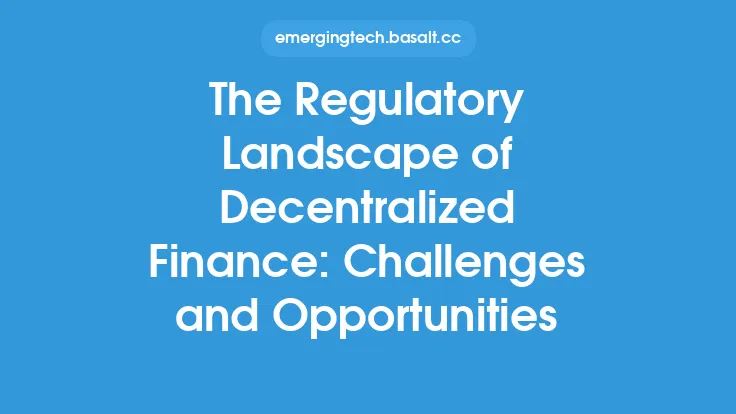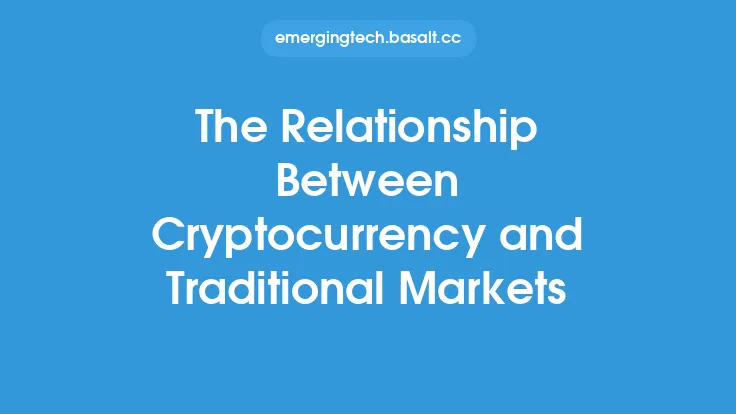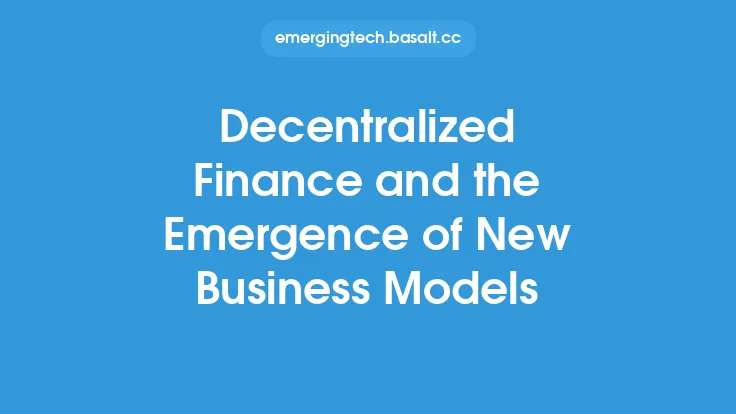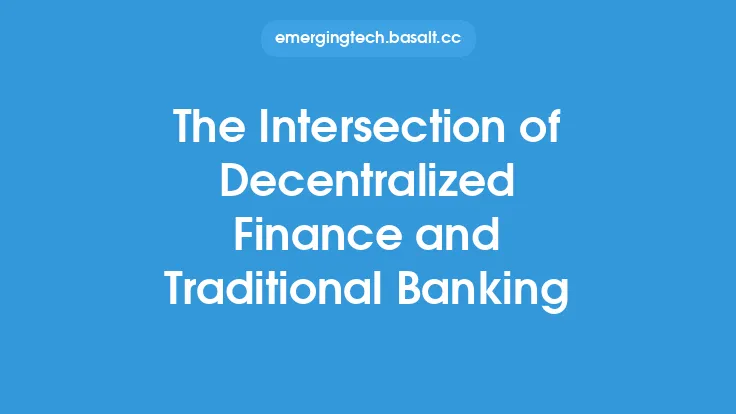The concept of decentralized finance, commonly referred to as DeFi, has been gaining significant attention in recent years due to its potential to revolutionize the way financial systems operate. At its core, DeFi aims to create a more open, accessible, and transparent financial ecosystem by leveraging blockchain technology and cryptocurrencies. This movement has the potential to impact the global economy in profound ways, offering new opportunities for financial inclusion, efficiency, and innovation.
Introduction to Decentralized Finance
Decentralized finance is built on the principles of decentralization, autonomy, and transparency. It seeks to disrupt traditional financial systems by providing an alternative to centralized institutions and intermediaries. DeFi applications, also known as dApps, operate on blockchain networks, allowing for peer-to-peer transactions without the need for intermediaries like banks. This not only reduces costs but also increases the speed of transactions, making financial services more accessible to a wider audience.
Key Components of DeFi
Several key components make up the DeFi ecosystem, including decentralized exchanges (DEXs), lending protocols, stablecoins, and prediction markets. Decentralized exchanges enable the trading of cryptocurrencies and other digital assets in a trustless and permissionless manner. Lending protocols allow users to lend and borrow cryptocurrencies, providing a new avenue for generating interest and accessing capital. Stablecoins, which are cryptocurrencies pegged to the value of a traditional asset like the US dollar, offer a stable store of value and medium of exchange. Prediction markets, on the other hand, enable users to bet on the outcome of events, creating a new form of decentralized betting and forecasting.
Benefits of DeFi
The benefits of DeFi are numerous and far-reaching. One of the most significant advantages is financial inclusion. DeFi applications can provide financial services to individuals and businesses in underserved or underbanked regions, promoting economic growth and development. DeFi also offers increased transparency and security, as all transactions are recorded on a public blockchain and are immutable. Additionally, DeFi applications can operate 24/7, without the need for intermediaries or traditional banking hours, making financial services more accessible and convenient.
Challenges Facing DeFi
Despite its potential, DeFi faces several challenges that must be addressed in order to achieve widespread adoption. One of the main challenges is regulatory uncertainty. The lack of clear regulations and guidelines has created a degree of uncertainty and risk for DeFi applications and users. Another challenge is scalability. Many blockchain networks are still in the early stages of development and are not yet capable of handling the high volume of transactions required for widespread adoption. Security is also a concern, as DeFi applications are not immune to hacking and other forms of cyber attacks.
The Future of DeFi
The future of DeFi is exciting and full of potential. As the ecosystem continues to evolve and mature, we can expect to see new and innovative applications emerge. The development of more scalable and secure blockchain networks will be critical to the growth of DeFi, as will the creation of clearer regulations and guidelines. Additionally, the integration of DeFi with traditional financial systems will be important for achieving widespread adoption and promoting financial inclusion. As DeFi continues to grow and evolve, it has the potential to create a more open, accessible, and transparent financial ecosystem, one that promotes economic growth and development for all.
Global Economic Impact
The potential global economic impact of DeFi is significant. By providing new opportunities for financial inclusion, efficiency, and innovation, DeFi can help to promote economic growth and development in underserved and underbanked regions. DeFi can also help to reduce poverty and inequality by providing access to financial services and opportunities for economic mobility. Additionally, DeFi can help to increase transparency and accountability in financial systems, reducing the risk of corruption and promoting more stable and secure economies. As DeFi continues to grow and evolve, it has the potential to create a more equitable and prosperous global economy, one that benefits all individuals and communities.
Conclusion
In conclusion, decentralized finance has the potential to revolutionize the way financial systems operate, offering new opportunities for financial inclusion, efficiency, and innovation. While there are challenges that must be addressed, the benefits of DeFi are numerous and far-reaching. As the ecosystem continues to evolve and mature, we can expect to see new and innovative applications emerge, promoting economic growth and development for all. The potential global economic impact of DeFi is significant, and it has the potential to create a more open, accessible, and transparent financial ecosystem, one that promotes economic growth and development for all.





